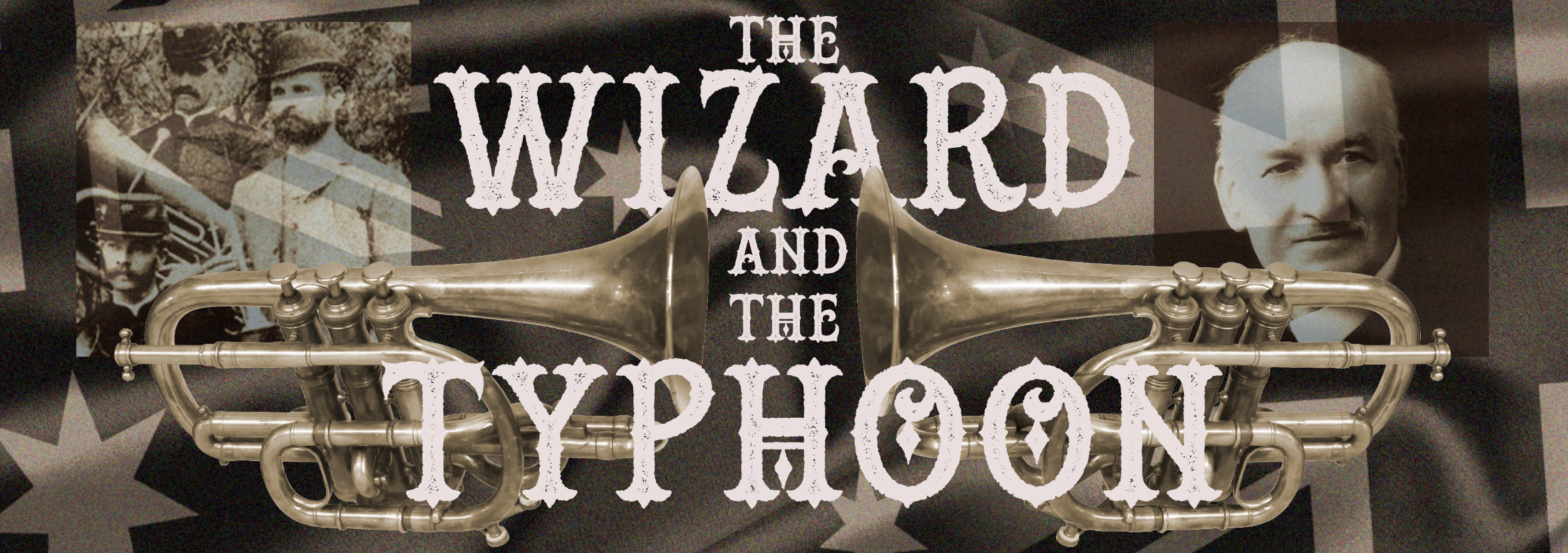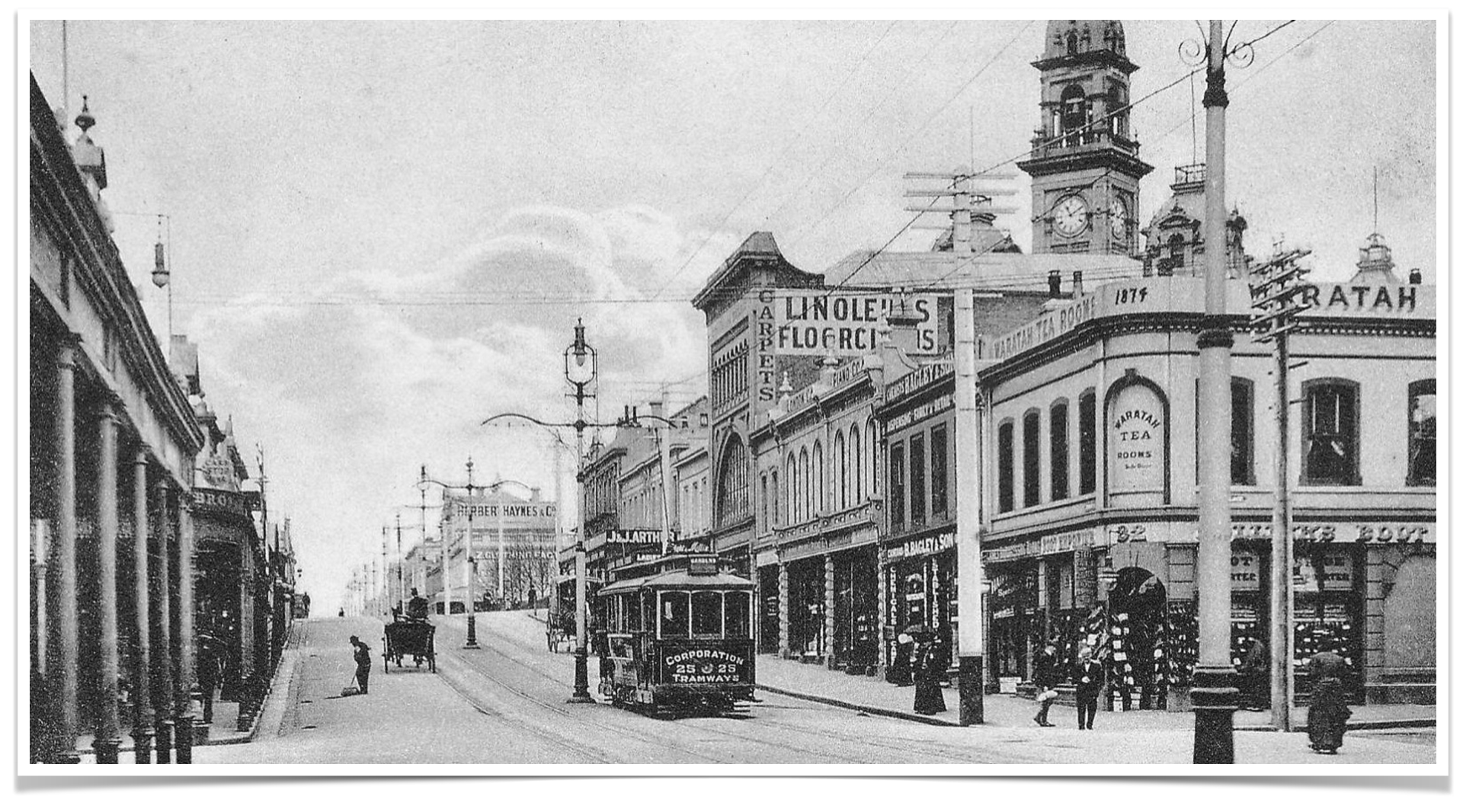For this post I must credit Mr Eric Tomkins, (Thomas Bulch’s grandson) as it’s not something I have written but something he found in a New Zealand newspaper of 1916, but it’s so interesting that I wanted to publish it directly as a blog post. It’s one of those rare things which is a first-hand account of Tom Bulch by a contemporary.
Incidentally the above photograph is of Dunedin in 1905, the New Zealand city where the band contest referred to in the article took place, where the writer first encountered Tom Bulch. Photograph is courtesy of the Dunedin City Council Archives on Flickr.
(Extract from the New Zealand Star of 19th May 1916)
Tom Bulch
The “Rambler” in the “Australian Bandsman” has been contributing a most interesting series of articles entitled “Looking Backwards,” being a series of reviews of forty years of band life in Australia. In the April number of the journal the “Rambler” refers to Mr. Tom Bulch’s connection with an early Commonwealth band periodical and his musical publications.
What bandsman has not heard of Tom Bulch? I met him first at the Dunedin contest of 1896. He came to New Zealand to judge that competition and proved himself to be a very capable adjudicator. Strange to say that it was the only contest that Mr. Bulch ever judged in the Dominion. That was the loss of bandsmen of New Zealand., I consider, for Mr. Bulch was exceptionally gifted. Not only was he a practical bandsman, which, of course, counts most in a young country in the years in which bands are being formed and is necessary to teach young men how to play instruments and read music, but he was a fine theorist and possessed a decided gift for composition. His arrangements were not difficult, and were constructed so that they could be performed by bands of moderate calibre. In Mr. Bulch’s earlier days in Australia there were no really first-class band playing combinations, and he established a band known as Bulch’s Model Band, which made a great name. But about the same time the renowned Newcastle City bandmaster, Mr. W. Barkel, was building up the then 4th Regimental Band, Newcastle, and Mr. Bulch was the first to admit its superiority over his own band.
I had not much opportunity of talking with Mr. Bulch at the Dunedin contest, for as conductor of the Oamaru Garrison Band (the winner), association or conversation with the judge was denied. But about a year later, when the band went to Melbourne to tale part in the Druids’ contest, then an Australian championship competition, I was frequently in Mr. Bulch’s company and then gained at first-hand information concerning is musical merits. Mr. Bulch used to visit the hotel at which the Oamaru Band was staying and he would sit down at the piano and play some of his favourite marches and other compositions.
Although the Oamaru Band did not win that contest, it was Mr. Bulch’s opinion that the band was the best in the competition and gave the most finished performances. And that opinion was something, coming from so practical a bandsman and so excellent an authority.
“Rambler” remarks that Mr. Bulch came to Australia bent on carving out a place for himself in the musical world, and no one will say that he has failed to achieve his purpose. Mr Bulch was ambitious in more ways than one. In his boyhood days he had learned his lesson well. He knew what men like Richard Smith and henry Round had done for the English bands, and he felt he could do for Australian bands what they had done for the bands at Home. His ambition flew higher than conducting. He aimed at becoming a publisher of music and the editor of a band journal like Round’s was in those days. He did not stop at dreaming. He did things. He wrote and composed his music and he published it: and ere long it was played from one end of the country to the other. “Craigielee”, “Maggie May”, and the “Young Recruit” were some of his numbers, and how they were played! Bulch published music, but he did more: he began the publication of a band paper, and it was in this connection that he displayed an amount of confidence in his journalistic ability, that had no-support in facts. Whatever merit he had as a writer of music it was soon plain that he had little as a compiler or dispenser of news. Luckily he did not embark on on his newspaper publishing enterprise on his own. He had partners, David Hannah and C Foret. Hannah knew just about as much about newspapers as Bulch did. But Foret, who was a compositor, had the practical part of the business, and was the bulwark of the new firm. “The Intercolonial Brass Band News” was the imposing title of the new venture. I have said that neither Bulch nor Hannah were cut out for newspaper work. Yet both men did much towards successfully launching the paper: Bulch because of his reputation among bandsmen, and Hannah because of his abilit to push sales. Hannah was for years associated with Fitzgerald’s Circus, playing solo cornet in conjunction with Von der Mehden. With the circus he travelled from end to end of Australia and through New Zealand and Tasmania as well. And wherever Dave went the merits of the “Intercolonial Brass Band News” were heralded. But the infant publication, though vigorous, required more nursing than either Bulch or Hannah were prepared to give it. The result was that these two “got out” leaving the venture in the hands of Foret (pronounced for-a), a volatile little Frenchman, who was brave enough to tale up the load alone. The paper first came out as the “Intercolonial Orchestral and Brass Band News”, not as the “Intercolonial Brass Band News” which was a later name given to it by Mons. Foret.
What I, personally, loved about this article when Eric sent it to me, was how objective it is. Rather than praising every aspect of Thomas’s endeavours it offers a balanced view admitting Thomas’s shortcomings regarding the newspaper venture, and his abilities in that respect, but in doing so adding strength to the testimony regarding how his musical endeavours and achievements. Where a person is willing to show criticism you sense the honesty in their praise. It’s also superb to read a first hand account from someone who had actually spoken to Tom Bulch, and acquired some sense perhaps of how ‘he’ thought things had gone. It’s an excellent little read that adds greatly to our understanding of Tom Bulch. Thanks very much for uncovering this Eric.

